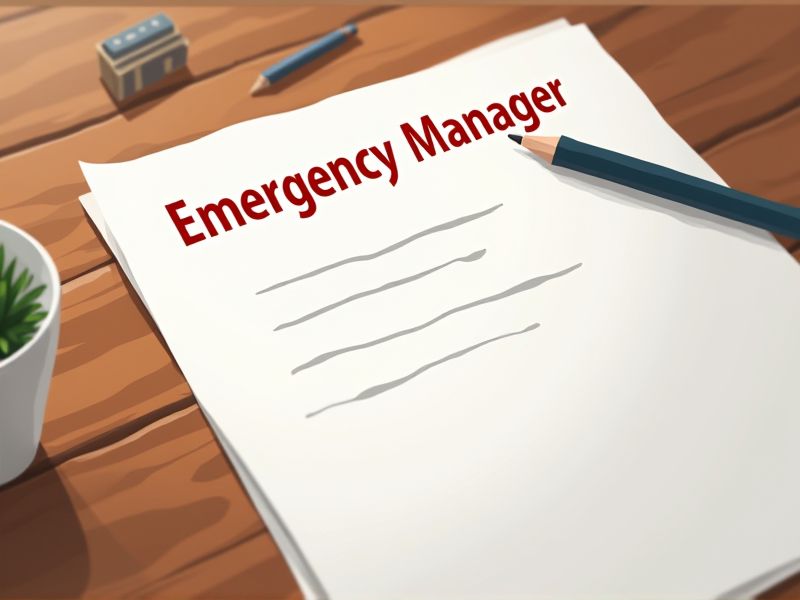
Emergency Managers play a critical role in safeguarding communities during crises, necessitating specific certifications for credibility and efficiency. These certifications ensure that managers possess the necessary skills to coordinate resources and make informed decisions in high-pressure situations. By obtaining such certifications, emergency managers demonstrate their understanding of best practices and modern emergency response strategies. Key certifications can enhance an emergency manager's competence and preparedness.
Certified Emergency Manager (CEM)
The designation of Certified Emergency Manager (CEM) serves as a standardized indicator of proficiency, ensuring that emergency managers possess essential skills and knowledge. Achieving CEM status enhances credibility, which can lead to increased trust and cooperation from stakeholders and the public during crisis situations. The rigorous certification process keeps professionals up-to-date with evolving best practices, which is crucial in an ever-changing threat landscape. Organizations benefit from hiring CEMs as it demonstrates a commitment to preparedness and effective response strategies, potentially reducing the impact of emergencies.
Associate Emergency Manager (AEM)
Organizations face increasing threats and complexities in managing emergencies, which necessitate the support of an Associate Emergency Manager to enhance operational capacity. An AEM provides critical assistance in planning, coordinating, and executing emergency response plans, which directly elevates the effectiveness of the Emergency Manager. By handling detailed tasks and logistical coordination, an AEM prevents overburdening the primary manager, thus preserving strategic oversight. Their presence facilitates continual, focused communication with all stakeholders, improving response times and decision-making during crises.
FEMA National Incident Management System (NIMS) Certification
FEMA's National Incident Management System (NIMS) Certification is essential for emergency managers because it standardizes incident response processes across different agencies, facilitating efficient coordination. It ensures that emergency managers are equipped with a common framework for handling various types of incidents, which improves the overall effectiveness of response efforts. The certification provides a structured approach to resource management, incident command, and communication, which are crucial for effective emergency management. By having this certification, emergency managers can better integrate into multi-agency responses, leading to a more unified and comprehensive disaster response effort.
Incident Command System (ICS) Certification
Acquiring an Incident Command System (ICS) Certification ensures that an Emergency Manager can effectively coordinate during emergency response operations, enhancing organizational efficiency. The certification provides a standardized framework, allowing different agencies to seamlessly collaborate by speaking a common operational language. Knowledge gained from ICS training enables an Emergency Manager to manage resources, which minimizes chaos during high-stake situations. ICS Certification fosters a clear chain of command, reducing confusion and promoting swift, decisive actions during crises.
Certified Business Continuity Professional (CBCP)
Organizations face potential disruptions like natural disasters or cyber-attacks. Employing a Certified Business Continuity Professional ensures an organization is equipped with expertly-crafted strategies for resilience. An emergency manager with a CBCP certification brings a verified skill set that enhances preparedness and response. This expertise reduces recovery time and mitigates financial and reputational losses.
Certified Safety Professional (CSP)
A Certified Safety Professional (CSP) enhances an emergency manager's credibility, ensuring stakeholders have trust in their decision-making during critical situations. The CSP credential equips emergency managers with a comprehensive understanding of safety standards, improving their ability to develop effective risk mitigation strategies. Possessing a CSP enables emergency managers to stay updated on evolving safety protocols, leading to more efficient response and recovery efforts. The specialized knowledge acquired through CSP certification contributes to improved coordination with other safety professionals, optimizing overall emergency response outcomes.
Certified Emergency Planner (CEP)
Emergency Managers often face complex situations that require specialized knowledge and skills, and a Certified Emergency Planner (CEP) provides the expertise to navigate these challenges. The CEP credential ensures that the professional has a validated understanding of emergency planning processes, enhancing the organization's overall preparedness. Data shows that emergency management outcomes improve when plans are created and implemented by certified individuals. The investment in a CEP can lead to more efficient use of resources during crises, reducing potential losses and improving recovery times.
Certified Homeland Protection Program Manager (CHPPM)
The CHPPM certification equips emergency managers with specialized knowledge, enhancing their ability to implement comprehensive homeland protection strategies. This certification indicates a higher level of expertise in risk assessment and resource allocation, crucial for managing large-scale emergencies. Holding a CHPPM can lead to improved coordination among agencies and stakeholders, ensuring a cohesive emergency response. The recognition of CHPPM status can also increase trust and credibility within the community and among peers, fostering more effective collaboration.
Hazardous Materials (HAZMAT) Certification
Emergency managers require Hazardous Materials (HAZMAT) Certification because it ensures they have the knowledge to handle and mitigate incidents involving dangerous substances. Certification equips them with the skills to assess risks accurately and make informed decisions during hazardous material emergencies, thereby minimizing harm. Without this certification, emergency managers could pose a risk to public safety and environmental health. Additionally, HAZMAT Certification is a legal requirement in many jurisdictions, aligning emergency management practices with regulatory standards and enhancing community trust.
CPR/First Aid Certification
CPR/First Aid Certification equips an emergency manager with crucial skills to stabilize victims during critical timeframes, potentially preventing fatalities. Knowledge of these emergency procedures ensures the manager can lead by example and instruct others efficiently in chaotic situations. Certification increases an individual's credibility when coordinating with medical professionals and other first responders. Understanding of basic life support enhances the overall effectiveness of emergency plans and decision-making processes in high-stress environments.
Summary
By obtaining certifications, you enhance your knowledge and credibility in emergency management. This can lead to increased job opportunities and promotions within the field. With advanced skills, you are better equipped to efficiently coordinate responses during crises. As a result, communities benefit from improved preparedness and resilience against emergencies.
